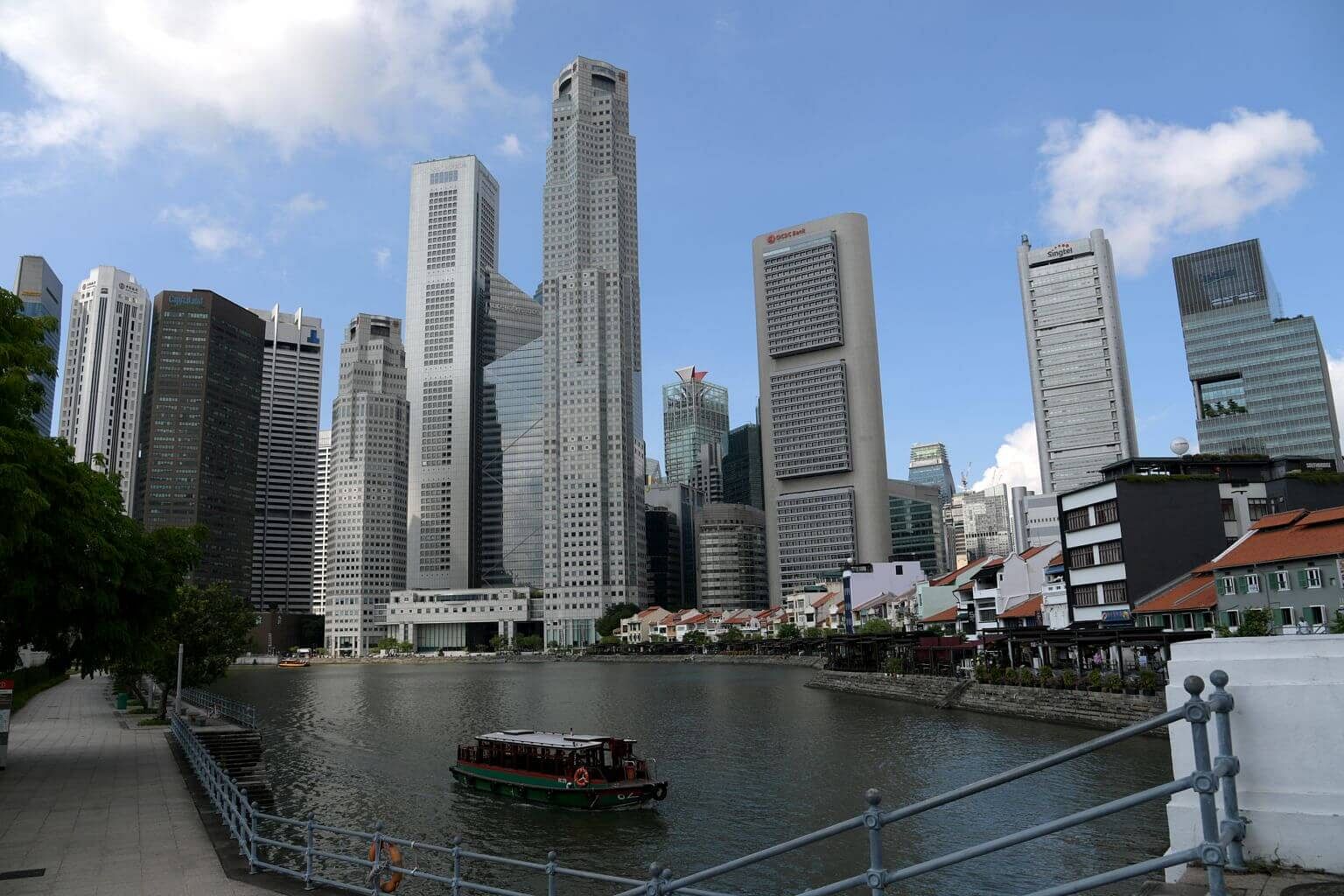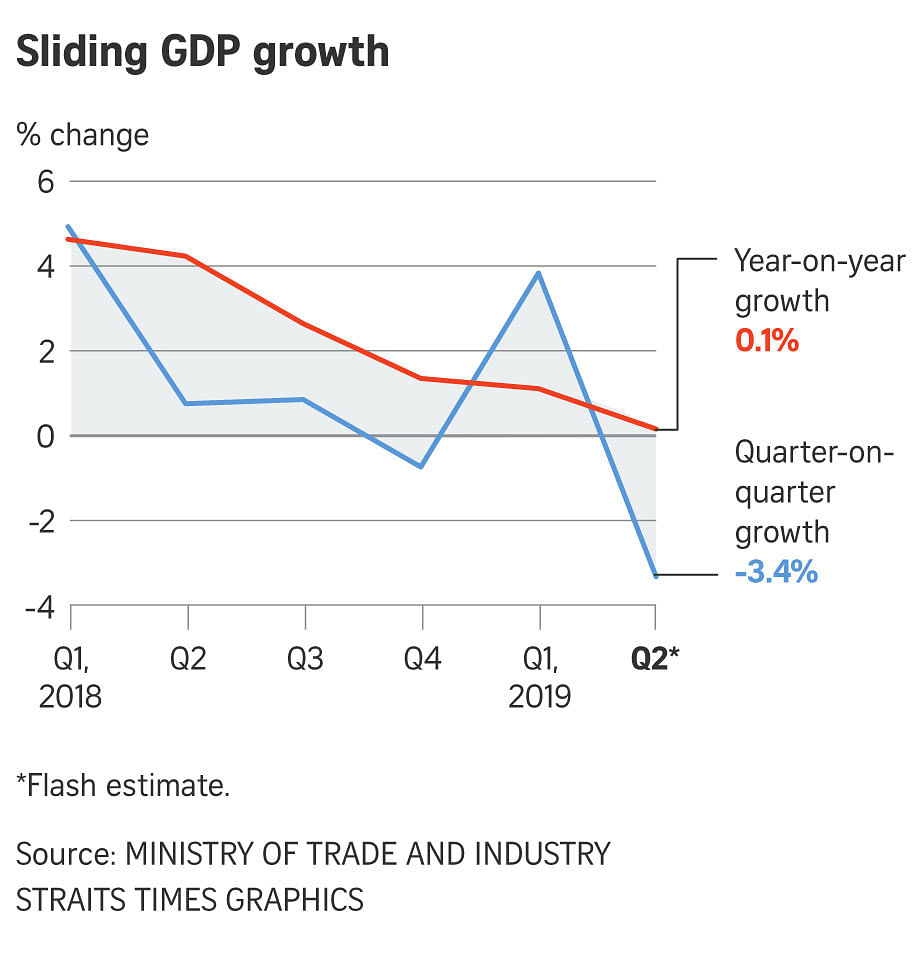Singapore's economy grows just 0.1% in Q2, lowest in decade and worse than expected
Sign up now: Get ST's newsletters delivered to your inbox

Flash estimates by the Ministry of Trade and Industry pegged Singapore's economic growth at 0.1 per cent in the second quarter this year, marking the sixth straight quarter of easing.
PHOTO: ST FILE
Seow Bei Yi
Follow topic:
SINGAPORE - Singapore's economy performed worse than expected in the second quarter, slowing again after hitting its lowest rate since the global financial crisis in the first three months of this year.
Flash estimates by the Ministry of Trade and Industry (MTI) pegged Singapore's economic growth at 0.1 per cent in the second quarter of this year, well below analysts' expectations of 1.1 per cent according to a Bloomberg forecast.
This is the lowest growth since the economy contracted by 1.2 per cent in the second quarter of 2009 during the Great Recession.
It is also a far cry from the revised 1.1 per cent growth in the previous quarter and marks the sixth straight quarter of easing.
On a quarter-on-quarter seasonally-adjusted annualised basis, the economy shrank by 3.4 per cent, after posting growth of 3.8 per cent in the preceding three months.
Economists said the latest figures showed weakness across key sectors, with all contracting from the first quarter of the year.
Manufacturing shrank 6 per cent from the previous quarter, while construction contracted by 7.6 per cent and services by 1.5 per cent.
Both construction and services reversed their previous quarter-on-quarter growth.
Ms Selena Ling, head of treasury research and strategy at OCBC Bank, told The Straits Times: "It does look like the risk of a technical recession is growing by the day."
A technical recession is defined by two consecutive quarters of slowdown.
"It's not just a manufacturing story, which we know can evolve quite rapidly with United States President Donald Trump's tweets," she said.
But she added "we are not that hopeful on trade either", noting that President Trump tweeted overnight on how China was letting the US down by not buying the agricultural products that it said it would.
An area of concern is how the latest slowdown could hit the labour market, said Ms Ling.
There is an "emerging softening" in services, suggesting consumer confidence may be dented and people are tightening their purse strings.
Ms Ling added that with current weakness, the odds of the Monetary Authority of Singapore (MAS) easing monetary policy in October has risen, a move that could help Singapore exports.
Policymakers here are already reviewing their 1.5 per cent to 2.5 per cent growth forecast for the year, as simmering trade tensions between the United States and China hit investments, trade and manufacturing, said MAS chief Ravi Menon last month.
While Maybank Kim Eng Research warned earlier that the country's economy will likely experience a "shallow technical recession" in the third quarter with a worsening of the global trade outlook, Maybank economist Chua Hak Bin said the latest figures suggest "the risk has shifted towards a deeper (technical) recession".
He added that a new lower range of 0.5 per cent to 1.5 per cent for full-year growth is looking more probable, adding that MTI will likely further downgrade forecast.
In the case of a deeper technical recession, he added, employment growth will likely slow further and retrenchments in manufacturing and trade-related services will likely worsen.
Lacklustre performance by the manufacturing sector dragged growth in the second quarter, even as construction continued its recovery and services grew compared to a year ago.
MTI's latest figures showed that manufacturing contracted by 3.8 per cent year on year in the second quarter, extending its 0.4 per cent decline previously.
"The contraction was due to output declines in the electronics and precision engineering clusters, which more than offset output expansions in the rest of the manufacturing clusters," it said.
Manufacturing took a larger hit than expected, and Dr Chua flagged further risks such as the broadening of the US-China trade war to export controls, which threatens to worsen disruption to supply chains.
"Unless there is a quick resolution to the trade war, manufacturing will likely continue to contract in the third quarter," he said.
Construction grew by 2.2 per cent, extending its 2.7 per cent growth previously, supported by an increase in public sector construction activities.
The services producing industries expanded by 1.2 per cent year-on-year, unchanged from the previous quarter, helped by the finance and insurance, "other services industries", and information and communications sectors.
In spite of the gloomy figures, DBS senior economist Irvin Seah pointed out that "advance figures tend to get revised up" for quarter-on-quarter growth, and the forecast for services is generally more conservative.
"With such a deep drop in the second quarter, chances of a positive sequential growth in the third quarter will be higher too," he said.


